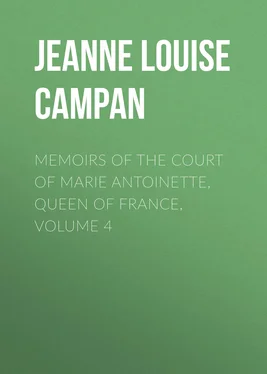Jeanne Louise Henriette Campan - Memoirs of the Court of Marie Antoinette, Queen of France, Volume 4
Здесь есть возможность читать онлайн «Jeanne Louise Henriette Campan - Memoirs of the Court of Marie Antoinette, Queen of France, Volume 4» — ознакомительный отрывок электронной книги совершенно бесплатно, а после прочтения отрывка купить полную версию. В некоторых случаях можно слушать аудио, скачать через торрент в формате fb2 и присутствует краткое содержание. Жанр: Биографии и Мемуары, История, foreign_edu, foreign_antique, foreign_prose, на английском языке. Описание произведения, (предисловие) а так же отзывы посетителей доступны на портале библиотеки ЛибКат.
- Название:Memoirs of the Court of Marie Antoinette, Queen of France, Volume 4
- Автор:
- Жанр:
- Год:неизвестен
- ISBN:нет данных
- Рейтинг книги:3 / 5. Голосов: 1
-
Избранное:Добавить в избранное
- Отзывы:
-
Ваша оценка:
- 60
- 1
- 2
- 3
- 4
- 5
Memoirs of the Court of Marie Antoinette, Queen of France, Volume 4: краткое содержание, описание и аннотация
Предлагаем к чтению аннотацию, описание, краткое содержание или предисловие (зависит от того, что написал сам автор книги «Memoirs of the Court of Marie Antoinette, Queen of France, Volume 4»). Если вы не нашли необходимую информацию о книге — напишите в комментариях, мы постараемся отыскать её.
Memoirs of the Court of Marie Antoinette, Queen of France, Volume 4 — читать онлайн ознакомительный отрывок
Ниже представлен текст книги, разбитый по страницам. Система сохранения места последней прочитанной страницы, позволяет с удобством читать онлайн бесплатно книгу «Memoirs of the Court of Marie Antoinette, Queen of France, Volume 4», без необходимости каждый раз заново искать на чём Вы остановились. Поставьте закладку, и сможете в любой момент перейти на страницу, на которой закончили чтение.
Интервал:
Закладка:
The journey to Fontainebleau and the winter at Paris and at Court were extremely brilliant. The spring brought back those amusements which the Queen began to prefer to the splendour of fetes. The most perfect harmony subsisted between the King and Queen; I never saw but one cloud between them. It was soon dispelled, and the cause of it is perfectly unknown to me.
My father-in-law, whose penetration and experience I respected greatly, recommended me, when he saw me placed in the service of a young queen, to shun all kinds of confidence. "It procures," said he, "but a very fleeting, and at the same time dangerous sort of favour; serve with zeal to the best of your judgment, but never do more than obey. Instead of setting your wits to work to discover why an order or a commission which may appear of consequence is given to you, use them to prevent the possibility of your knowing anything of the matter." I had occasion to act on this wise advice. One morning at Trianon I went into the Queen's chamber; there were letters lying upon the bed, and she was weeping bitterly. Her tears and sobs were occasionally interrupted by exclamations of "Ah! that I were dead!—wretches! monsters! What have I done to them?" I offered her orange-flower water and ether. "Leave me," said she, "if you love me; it would be better to kill me at once." At this moment she threw her arm over my shoulder and began weeping afresh. I saw that some weighty trouble oppressed her heart, and that she wanted a confidant. I suggested sending for the Duchesse de Polignac; this she strongly opposed. I renewed my arguments, and her opposition grew weaker. I disengaged myself from her arms, and ran to the antechamber, where I knew that an outrider always waited, ready to mount and start at a moment's warning for Versailles. I ordered him to go full speed, and tell the Duchesse de Polignac that the Queen was very uneasy, and desired to see her instantly. The Duchess always had a carriage ready. In less than ten minutes she was at the Queen's door. I was the only person there, having been forbidden to send for the other women. Madame de Polignac came in; the Queen held out her arms to her, the Duchess rushed towards her. I heard her sobs renewed and withdrew.
A quarter of an hour afterwards the Queen, who had become calmer, rang to be dressed. I sent her woman in; she put on her gown and retired to her boudoir with the Duchess. Very soon afterwards the Comte d'Artois arrived from Compiegne, where he had been with the King. He eagerly inquired where the Queen was; remained half an hour with her and the Duchess; and on coming out told me the Queen asked for me. I found her seated on the couch by the side of her friend; her features had resumed their usual cheerful and gracious appearance. She held out her hand to me, and said to the Duchess, "I know I have made her so uncomfortable this morning that I must set her poor heart at ease." She then added, "You must have seen, on some fine summer's day, a black cloud suddenly appear and threaten to pour down upon the country and lay it waste. The lightest wind drives it away, and the blue sky and serene weather are restored. This is just the image of what has happened to me this morning." She afterwards told me that the King would return from Compiegne after hunting there, and sup with her; that I must send for her purveyor, to select with him from his bills of fare all such dishes as the King liked best; that she would have no others served up in the evening at her table; and that this was a mark of attention that she wished the King to notice. The Duchesse de Polignac also took me by the hand, and told me how happy she was that she had been with the Queen at a moment when she stood in need of a friend. I never knew what could have created in the Queen so lively and so transient an alarm; but I guessed from the particular care she took respecting the King that attempts had been made to irritate him against her; that the malice of her enemies had been promptly discovered and counteracted by the King's penetration and attachment; and that the Comte d'Artois had hastened to bring her intelligence of it.
It was, I think, in the summer of 1787, during one of the Trianon excursions, that the Queen of Naples—[Caroline, sister of Marie Antoinette.]—sent the Chevalier de Bressac to her Majesty on a secret mission relative to a projected marriage between the Hereditary Prince, her son, and Madame, the King's daughter; in the absence of the lady of honour he addressed himself to me. Although he said a great deal to me about the close confidence with which the Queen of Naples honoured him, and about his letter of credit, I thought he had the air of an adventurer.—[He afterwards spent several years shut up in the Chateau de l'Oeuf.]—He had, indeed, private letters for the Queen, and his mission was not feigned; he talked to me very rashly even before his admission, and entreated me to do all that lay in my power to dispose the Queen's mind in favour of his sovereign's wishes; I declined, assuring him that it did not become me to meddle with State affairs. He endeavoured, but in vain, to prove to me that the union contemplated by the Queen of Naples ought not to be looked upon in that light.
I procured M. de Bressac the audience he desired, but without suffering myself even to seem acquainted with the object of his mission. The Queen told me what it was; she thought him a person ill-chosen for the occasion; and yet she thought that the Queen, her sister, had done wisely in not sending a man worthy to be avowed,—it being impossible that what she solicited should take place. I had an opportunity on this occasion, as indeed on many others, of judging to what extent the Queen valued and loved France and the dignity of our Court. She then told me that Madame, in marrying her cousin, the Duc d'Angouleme, would not lose her rank as daughter of the Queen; and that her situation would be far preferable to that of queen of any other country; and that there was nothing in Europe to be compared to the Court of France; and that it would be necessary, in order to avoid exposing a French Princess to feelings of deep regret, in case she should be married to a foreign prince, to take her from the palace of Versailles at seven years of age, and send her immediately to the Court in which she was to dwell; and that at twelve would be too late; for recollections and comparisons would ruin the happiness of all the rest of her life. The Queen looked upon the destiny of her sisters as far beneath her own; and frequently mentioned the mortifications inflicted by the Court of Spain upon her sister, the Queen of Naples, and the necessity she was under of imploring the mediation of the King of France.
She showed me several letters that she had received from the Queen of Naples relative to her differences with the Court of Madrid respecting the Minister Acton. She thought him useful to her people, inasmuch as he was a man of considerable information and great activity. In these letters she minutely acquainted her Majesty with the nature of the affronts she had received, and represented Mr. Acton to her as a man whom malevolence itself could not suppose capable of interesting her otherwise than by his services. She had had to suffer the impertinences of a Spaniard named Las Casas, who had been sent to her by the King, her father-in-law, to persuade her to dismiss Mr. Acton from the business of the State, and from her intimacy. She complained bitterly to the Queen, her sister, of the insulting proceedings of this charge d'affaires, whom she told, in order to convince him of the nature of the feelings which attached her to Mr. Acton, that she would have portraits and busts of him executed by the most eminent artists of Italy, and that she would then send them to the King of Spain, to prove that nothing but the desire to retain a man of superior capacity had induced her to bestow on him the favour he enjoyed. This Las Casas dared to answer her that it would be useless trouble; that the ugliness of a man did not always render him displeasing; and that the King of Spain had too much experience not to know that there was no accounting for the caprices of a woman.
Читать дальшеИнтервал:
Закладка:
Похожие книги на «Memoirs of the Court of Marie Antoinette, Queen of France, Volume 4»
Представляем Вашему вниманию похожие книги на «Memoirs of the Court of Marie Antoinette, Queen of France, Volume 4» списком для выбора. Мы отобрали схожую по названию и смыслу литературу в надежде предоставить читателям больше вариантов отыскать новые, интересные, ещё непрочитанные произведения.
Обсуждение, отзывы о книге «Memoirs of the Court of Marie Antoinette, Queen of France, Volume 4» и просто собственные мнения читателей. Оставьте ваши комментарии, напишите, что Вы думаете о произведении, его смысле или главных героях. Укажите что конкретно понравилось, а что нет, и почему Вы так считаете.












